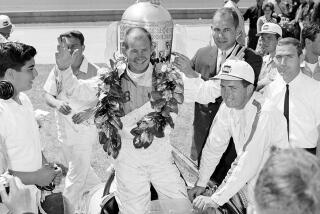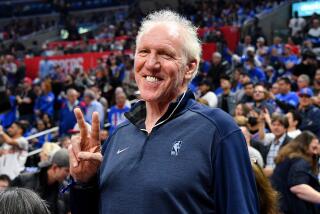Just Taking a Fast Drive Down to Payton Place
- Share via
DEL MAR — Should the day come when Walter Payton wins Le Mans or Indy or Daytona, I would like the world to know the role I played in the formative years of his second career.
Unwittingly, I may even have gotten him started.
When Payton was gainfully employed with the Chicago Bears in the fall of 1978, I was to pick him up at Serra High School after a practice for a Monday night game with the Chargers. I cleaned out the ash trays and plugged in a tape, these being the only chores I can handle relating to automobiles.
“Gimme the keys,” Payton said. “I’ll drive.”
And away we went. Had I known that this trip was going to plant the seeds for his future beyond the National Football League, I would have been more helpful with driving tips. I would have said more than “Right here” or “Left there.”
I reminded Payton of our ride on the mild side while visiting his garage Friday at the Del Mar Grand Prix.
“Oh yeah,” he said, brightening, “I remember going down the hill outside the parking lot.”
That was the only place he could have gotten any sensation of speed in the family sedan.
Walter Payton has always been about speed, whether carrying the football or choosing an automobile.
Indeed, his interest in fast cars may well pre-date racing down the Tierrasanta Boulevard hill. His personal automobile inventory has usually been a highway patrolman’s smorgasbord. Payton has always liked cars that look as if they are nudging the speed limit while parked.
Ove Olsson, owner of Olsson Engineering in the Chicago area, met Payton maybe 10 years ago when the running back was trying to get one of his machines serviced. Olsson suggested he might be interested in racing.
“It was between me and the Illinois state troopers,” Olsson laughed, “but the Bears wouldn’t let him race. He started into racing when he retired.”
Payton’s last NFL season was 1987, though it seems like only yesterday when he was darting through non-existent holes and racing through frustrated secondaries. Though he has been dabbling in racing since, this is his first full season. He will be racing his NFL Team 34--guess what number’s on the car--in the Oldsmobile Pro Series today.
It seems like a rather obvious progression, that of taking a football and going as hard as he can as fast as he can without getting hit to taking a steering wheel and going as hard as he can as fast as he can without getting hit . . . or, in this case, hitting anything.
There are parallels, Payton conceded.
“You have to have hand, foot and eye coordination,” he said. “You have to be quick and have control.”
The biggest difference is that the focus on a race driver is maybe a little bit more intense.
“It’s an individual sport,” he said. “On the football field, you have to have 11 guys doing well to do well. On the race track, you’re the guy who has to do it. You have your pit crew, but you’re out there alone. It can feel good or it can feel bad. You can feel like a king or a dunce. What happens depends on you, because you can’t blame the car.”
Payton is still a neophyte on the race track, though he is obviously a quick study. He went from professional football directly into professional racing, taking a detour around amateur racing.
Tony Kester, the point-leader in the Oldsmobile Pro Series, is also Payton’s driving coach.
“He’s very aggressive and very talented,” Kester said. “And he’s very advanced for what experience he has. Just his athletic ability alone makes a tremendous difference. I think football helped him. You have to think clearly when you’re being hit from all sides by linebackers and you have to think clearly under the pressure of driving a race car.”
Payton, obviously, is advancing quite nicely. He is not in auto racing’s version of the NFL, but it may be only a matter of time.
“His potential is unlimited,” Kester said. “It will depend on how much time he wants to spend learning his craft. This isn’t something you do overnight. It’s a learned art.”
Walter Payton knows that. He would like to someday drive at Le Mans, and you sense he will ultimately do what it is he would like to do.
“But you have to pay your dues,” he said. “It’s totally different driving on the street and driving on the track. Anybody can drive fast in the street, but this is a race car. You have to finesse it.”
With everything else in his life, endorsements and business interests et al, can he really spend the time it will take to be the best he can be?
“This,” he said, “is what I enjoy.”
That being the case, I suspected he would succeed.
More to Read
Go beyond the scoreboard
Get the latest on L.A.'s teams in the daily Sports Report newsletter.
You may occasionally receive promotional content from the Los Angeles Times.










